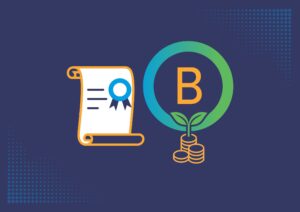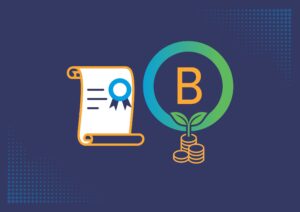At a Glance
- B Corp certification verifies that a company meets the highest standards of social and environmental performance, accountability, and transparency.
- New 2025 B Corp standards introduce stricter, topic-based requirements to raise the bar for impact.
For SMEs, certification builds credibility, strengthens culture, and opens doors to international opportunities.
Introduction
In a world where sustainability claims are everywhere, real credibility is rare; consumers, investors, and partners no longer take “we care about the planet” at face value; they are focused on the proof.
For small and midsize enterprises (SMEs), that proof often comes in the form of certification. Among the growing list of sustainability badges, one has gained global recognition: B Corp certification.
It signals that a company doesn’t just talk about responsibility but embeds it into how it’s governed, how it treats people, and how it impacts the planet.
Understanding what it means to be a B Corp, how the new standards are reshaping expectations, and whether the certification delivers enough value for resource-limited SMEs is key to making an informed decision.
What Is B Corp Certification?
B Corp certification is awarded by B Lab, a global nonprofit that measures how a company operates, not just what it sells. It evaluates the overall social and environmental performance of a business, along with its governance, accountability, and transparency.
Until recently, companies qualified by completing the B Impact Assessment (BIA), scoring at least 80 points across five key areas:
- Governance and ethics
- Workers’ well-being
- Community engagement
- Environmental impact
- Customer stewardship
This framework is still active for companies currently applying under the existing version of the standards. However, from 2025 onward, B Lab will transition to a new standards model, replacing the points-based system with mandatory requirements across roughly seven Impact Topics.
Certified companies must also maintain a legal commitment to consider the interests of all stakeholders, not just shareholders, in decision-making.
More than 8,000 companies in over 90 countries are certified, ranging from household names like Patagonia to purpose-driven SMEs and consultancies.
What’s Changing: The New B Corp Standards (2025–2026)
B Lab has made one of the most significant certification framework revisions yet. The updated standards, officially released in April 2025, mark a major shift in what it takes to become or remain a B Corp.
Key updates
- The previous points-based scoring system (requiring 80+ points) is being replaced by mandatory baseline requirements across defined impact topics.
- The new structure emphasizes seven Impact Topics, including Purpose & Stakeholder Governance, Fair Work, Human Rights, Climate Action, Justice, Equity, Diversity & Inclusion (JEDI), Environmental Stewardship & Circularity, and Government Affairs & Collective Action.
- Implementation timeline: Submissions under the old standard (Version 6) must meet cut-offs (e.g., large enterprises by December 2025), and new certification under the updated standard begins in 2026 in many regions.
- The updated standards integrate size- and sector-based expectations, tailoring requirements to smaller businesses or specific industries, improving accessibility for SMEs.
Why this matters for SMEs
These changes mean that for SMEs considering B Corp certification
- The bar is higher. You must demonstrate consistent performance across all core topics, not simply accumulate points in a few.
- There is a stronger premium on verification and transparency, meaning your internal systems and data-collection practices must be robust.
- Although the process is more demanding, the tailored requirements and official timelines give you time to prepare and align your systems.
By understanding this transition and structuring your readiness accordingly, SMEs can leverage the new B Corp standards as a certification and as a strategic improvement process.
Why B Corp Certification Matters for SMEs
1. Global credibility and competitive advantage
B Corp is recognized across industries and borders.
For SMEs in regions like the UAE and Saudi Arabia, it offers a trusted benchmark that aligns with international sustainability expectations and helps attract global clients and investors.
2. A framework for improvement
The B Impact Assessment functions as a roadmap for better business.
It highlights strengths and weaknesses across governance, operations, and culture, giving SMEs a structured path to improve before or after certification.
3. Stronger culture and employee engagement
Purpose-driven companies retain talent.
The certification process encourages inclusive decision-making and clear values, which can improve morale and loyalty across teams.
4. Added confidence for clients and partners
Procurement teams and investors are increasingly asking suppliers to prove their sustainability credentials. A B Corp seal demonstrates accountability and systems thinking, which is valuable when competing for international tenders or long-term partnerships.
B Corp vs Other Frameworks
Feature | B Corp | ISO Standards (9001, 14001, 45001) | ESG Reporting (GRI, SASB) |
Focus | Social & environmental performance of the business | Process and quality management | Disclosure of sustainability data |
Verification | Third-party review by B Lab | Accredited external audit | Self-reported or assured |
Legal commitment | Stakeholder governance required | Not required | Not required |
Global recognition | High among investors and conscious consumers | High in technical industries | High for listed companies |
These frameworks can complement one another.
An SME with ISO or ESG systems already in place will find it easier to meet the governance and reporting standards required for B Corp certification.
Is It Worth It for SMEs?
B Corp certification is not for every business; it takes time, effort, and leadership buy-in.
However, for SMEs that see sustainability as part of their growth strategy, the benefits are tangible.
Top reasons SMEs pursue B Corp certification:
- Strengthened brand reputation and trust.
- Improved operational systems and risk management.
- Alignment between purpose, performance, and profitability.
- Easier access to clients and tenders that prioritize sustainability.
Many companies also report that the process itself (not just the label) transforms their culture and clarity of purpose.
Getting Started: Practical Steps
- Start with the B Impact Assessment.
It’s free and helps you benchmark where you stand. - Identify your gaps.
Focus on measurable areas like governance, environmental impact, and employee engagement. - Document and formalize systems.
Policies, processes, and tracking tools are essential for verification. - Engage your team.
Employees’ input often improves both performance and culture. - Work with a sustainability partner.
Guidance from experts familiar with certification and management systems helps you move faster and more confidently.
Conclusion
For SMEs ready to compete on trust, transparency, and performance, B Corp certification is one of the most respected standards in the world.
It validates your impact while helping you build better systems, attract the right people, and future-proof your business against shifting market expectations.
The process is rigorous, but so are the rewards. With the new 2025 standards, now is the right time to evaluate your readiness and decide how far you want to go.
How Consultmania Supports B Corp Readiness
Consultmania helps SMEs prepare for certifications like B Corp by building the systems behind the impact story.
We integrate governance, sustainability, and compliance into one framework that works for your business size and growth stage.
Our support includes:
- Gap analysis using the B Impact Assessment.
- System design aligned with the new B Corp standards.
- Policy and process development to ensure measurable results.
- Training to embed sustainability principles across teams.
If you’re exploring whether B Corp is the right fit, contact us to understand where you stand and how to build a roadmap toward certification.
FAQs
It evaluates a company’s social and environmental performance, governance structure, and overall accountability through the B Impact Assessment.
Typically, six to twelve months, depending on your current systems and readiness.
They introduce 10 mandatory impact areas (from climate action to governance), replacing the flexible scoring system with clear, measurable requirements.
Yes. It helps regional businesses demonstrate global credibility, attract impact-driven partners, and align with sustainability expectations in international markets.
Annual fees start at around USD 1,000 for small companies, scaling with revenue. Additional costs depend on preparation and documentation needs.




